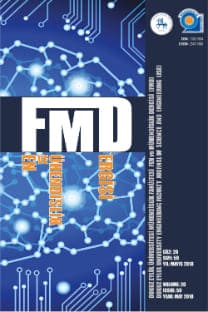GELİŞİGÜZEL OLUŞTURULMUŞ MULTİSTATİK SENSÖR SAHALARININ PERFORMANS TAHMİNİ
Sualtı Akustik Tespit Sistemleri (SATS) temel olarak alıcı ve vericilerden oluşmaktadır. Birbirlerinden bağımsız birden çok alıcı ve vericiden oluşan SATS’lere multistatik sistemler; bu sistemler kullanılarak gözetlenen/aranan deniz sahalarına ise multistatik sensör sahaları adı verilir. Çok sayıda sensörün koordineli olarak kullanılması ile oluşturulan bu tür sahalarda beklenen hedef tespit başarısının veya sağlanan saha kaplamasının tahmin edilebilmesi planlayıcılar için büyük önem taşımaktadır. Bu çalışmada, bir deniz sahasında gelişigüzel olarak oluşturulmuş multistatik SATS’inin etkinliği; alıcı-verici sayısı, saha genişliği ve tespit mesafesi parametreleri dikkate alınarak analitik yöntemlerle yakınsanmış, en yüksek kaplamanın sağlanabilmesi için sensörlerin kullanılması gereken optimum saha genişliği tespit edilmiştir. Çalışma sonunda elde edilen tüm teorik sonuçlar Monte Carlo simülasyonları ile doğrulanmıştır
Anahtar Kelimeler:
Multistatik sistemler, Saha kaplaması, Sualtı sensörleri
PERFORMANCE PREDICTION FOR RANDOMLY DEPLOYED MULTISTATIC SENSOR FIELDS
Underwater Acoustic Detection Systems (UADS) are basically composed of sources and receivers. UADSs composed of multiple independent sources and receivers are called as multistatic systems and the areas that are searched/patrolled by such systems are called multistatic fields. It is crucial for planners to be able to correctly estimate the target detection performance as well as the area coverage in such fields where several sensors are used in synchronization. In this study, the effectiveness of a randomly deployed multistatic UADS in a naval field is approximated by analytical methods using parameters as the number of sensors, field area and detection range. Moreover the optimal sensor field area is determined to achieve the highest area coverage. All theoretical results gained at the end of the study are confirmed through Monte Carlo simulation runs
Keywords:
Multistatic systems, Area coverage, Underwater sensors,
___
- Abramovitz S., Stegun, I. (1964): “Handbook of Mathematical Functions”, National Bureau of Standards, Applied Mathematics Series 55, Washington, DC, sf. 374-8.
- Cox H. (1989): “Fundamentals of Bistatic Active Sonar”, Underwater Acoustic Data Processing, Kluwer, sf. 3-24.
- DelBalzo D .R., McNeal D. N., Kierstead D. P. (2005): “Optimized Multistatic Sonobuoy Fields”, Oceans’05 Europe, Brest, Almanya.
- Glenn J. A., Littler G. H. (1984): “A Dictionary of Mathematics”, London: Harper and Row.
- Hirst A. E., Lloyd E. K. (1997): “Cassini, His Ovals, and a Space Probe to Saturn”, The Mathematical Gazette, Cilt 81, No. 492, sf. 409–421.
- James G., James R. C. (1949): “Mathematics Dictionary”, D. Van Nostrand Co., Inc., New York, sf. 39.
- Khilji M. J. (2004): “Multi Foci Closed Curves”, Journal of Theoretics, Cilt 6-6.
- Mathworld W. (2012): “Cassini Ovals.”, http://mathworld.wolfram.com/ CassiniOvals.html.
- Matz F. (1985): “The Rectification of the Cassinian Oval by Means of Elliptic Functions”, Am.Math. Monthly, Cilt 2, sf. 355-357.
- Patrick N. N., Warren L. J. F., Mohamed A. E. (2006): “Multiobjective Multistatic Sonar Sensor Placement”, IEEE Congress on Evolutionary Computations, Vancouver, BC, Kanada.
- Urick R. J. (1983): “Principles of Underwater Sound”, 3rd Edition, McGraw-Hill Companies, New York, Amerika.
- Tharmarasa R., Kirubarajan T., Lang T. (2009:) “Joint Path Planning and Sensor Subset Selection for Multistatic Sensor Networks”, The 2009 IEEE Symposium on Computational Intelligence in Security and Defense Applications, Ottowa, Kanada.
- Walsh M. J., Wettergren T. A. (2008): “Search Performance Prediction for Multistatic Sensor Fields”, Technical Report, Naval Undersea Warfare Center, Newport, RI.
- Washburn A. (2002): “Search and Detection”, Informs, 4th edition, sf. 9-1.
- Washburn A. R. (2010): “A Multistatic Sonobuoy Theory”, Technical Report, Naval Postgraduate School, Monterey, CA.
- Willis N. J. (2008): “Bistatic Radar”, Radar Handbook, Skolnik M. I. (Editor in Chief), McGraw-Hill Professional, sf. 23.4.
- Yakubovskiy A. (2000): “A Whole New Vision Underwater: Bistatic Sonar Explained”, Farsounder Inc..
- ISSN: 1302-9304
- Yayın Aralığı: 3
- Başlangıç: 1999
- Yayıncı: Dokuz Eylül Üniversitesi Mühendislik Fakültesi
